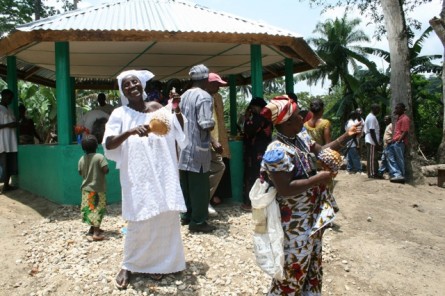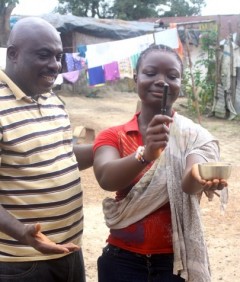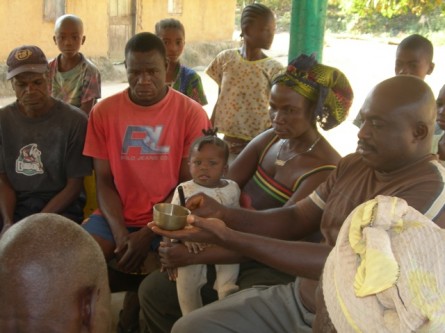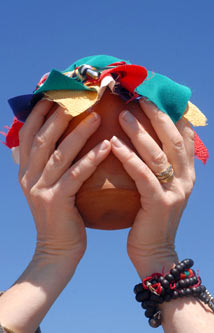Peace Hut Alliance for Conflict Transformation in Liberia
“We will create a space where the truth is sacred, and renew our peacebuilding efforts to heal fractured communities. I am prepared to be the first to appear before it, to say what I have already said, to challenge untruths, to say what I have done and what I have not done and to demonstrate that no one is above this process of healing and truth telling.”
— President of Liberia, Ellen Johnson Sirleaf
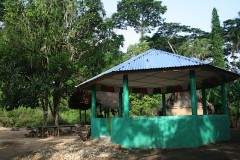 The first Palava Hut constructed through Alliance for the Earth’s partnership with the Peace Hut Alliance can be found in Telewoyan Village, Lofa County, Voinjama
The first Palava Hut constructed through Alliance for the Earth’s partnership with the Peace Hut Alliance can be found in Telewoyan Village, Lofa County, Voinjama
The Peace Hut Alliance for Conflict Transformation has successfully built three Peace Huts in violence-prone regions of Liberia and dug a well for fresh water next to the first Peace Hut in the village where an Earth Treasure Vase was buried. The team of skilled and passionate peace builders – Harper M. Karmon, Christian Wolo Bethelson, and Annie Nushann run programs inside each of the three Peace Huts to empower women and bring healing and reconciliation to former combatants and child soldiers. Their vision is to build a Peace Hut with a well in all 15 Counties across Liberia.
Bethelson and Harper also host a weekly national radio program, Conversations Under the Peace Hut, that educates the public about Ebola prevention and invites people to stay calm and mindful in the face of this deadly disease. The sound of the bell and the power of mindful living is opening the way to peace and healing. A culture of peace may yet be possible.
Contents:
Liberia’s Women End the Civil War
The Palava Peace Hut Tradition
The Peace Hut Alliance
The Origins of the Liberia Peace Hut Alliance
Mindfulness in PeaceBuilding
Get Involved
Our Liberia Partners
Dedication of the Ganta, Nimba County, Peace Hut
Liberia’s Women End the Civil War
The second Liberian Civil War ended in 2003 when the women — Christian and Muslim alike — came together in prayer and nonviolent resistance to end the conflict that had shattered the nation. They founded a movement for peace and reconciliation, grounded in their moral conviction and courage, that continues today. In 2005, Liberia held its first democratic election, resulting in the presidency of Ellen Johnson Sirleaf, the first female head of state in Africa. Sirleaf was awarded the 2011 Nobel Peace Prize, jointly with Leymah Gbowee of Liberia and Tawakel Karman of Yemen. The women were recognized “for their non-violent struggle for the safety of women and for women’s rights to full participation in peace-building work.”
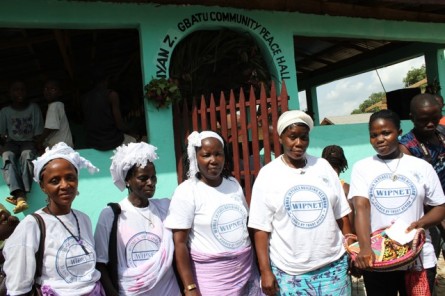 Annie Nushann (center) with members of The Women in Peacebuilding Network at Ganta Peace Hut
Annie Nushann (center) with members of The Women in Peacebuilding Network at Ganta Peace Hut
The Palava/Peace Hut Tradition
The government of President Ellen Johnson Sirleaf has recognized that after nearly 14 years of destructive and divisive civil war, reconciliation remains one of its main challenges. In its final report, the Truth and Reconciliation Commission of Liberia recommends, among other strategies, the “palava hut peacebuilding mechanism.” The aim of this is to foster peace and dialogue and rebuild broken relationships, fostering national reconciliation and healing, beginning at the grassroots.
The palava/peace hut is a traditional building that has been part of Liberian culture for many generations. Although these huts can still be seen around the countryside, during the war its significance was lost and its presence ignored even though everyone knows its purpose is to serve as a place to resolve conflict and come together in peace.
The huts draw upon a generations-old means to reconcile the wounds of war and solve conflicts independently of the courts. These structures are literally open to all sides equally and provide a neutral meeting place where members of a community can hear and impart justice. In this context, the win-lose rulings of corrupt courts can transform into win-win solutions for many civil cases.
The Peace Hut Alliance
Alliance for the Earth has developed a strong collaboration with our Liberian partners to nurture the birth of this inspiring organization, the Peace Hut Alliance for Conflict Transformation. The Peace Hut Alliance is now offering unique and important programs to support the creation of peace from the ground up, rebuild lives, and enhance the participation of youth, women, and ex-combatants in reconciliation and peacebuilding efforts in Liberia. The team of the Peace Hut Alliance, Harper M. Karmon, Christian Wolo Bethelson and Annie Nushann, is already working with communities in three counties and intends to work with community leaders in all 15 counties (states) to construct palava peace huts across the country. These Peace Huts will be used as regular community gathering places for dialogue, conflict resolution, storytelling, education and sports.
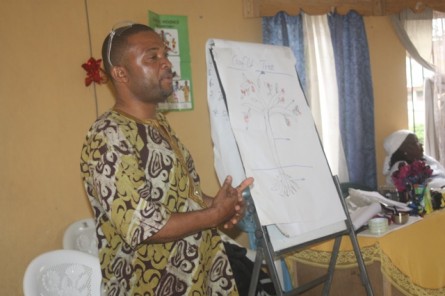 Harper Karmon teaching conflict resolution inside the Peace Hut
Harper Karmon teaching conflict resolution inside the Peace Hut
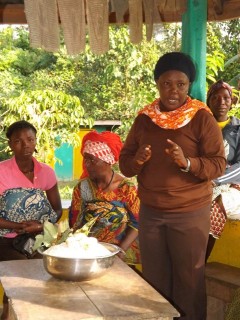 Annie Nushann teaching inside the Telewoyan Village Peace Hut
Annie Nushann teaching inside the Telewoyan Village Peace Hut
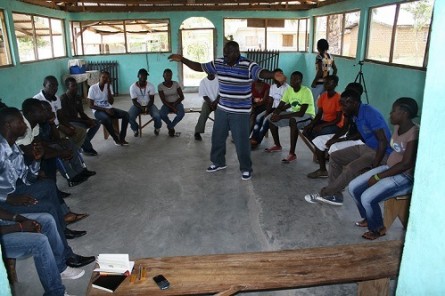 Christian Bethelson teaching youth inside the Ganta Peace Hut
Christian Bethelson teaching youth inside the Ganta Peace Hut
It is our intention that Peace Huts will be constructed in every county in Liberia. Every hut will include toilets and a hand pump well to provide much needed safe drinking water. Water and sanitation are essential for good health and, after many years of civil conflict, Liberians have yet to see pipe-borne water even in the cities. Each community will provide the land, design and labor for their own peace hut and well.
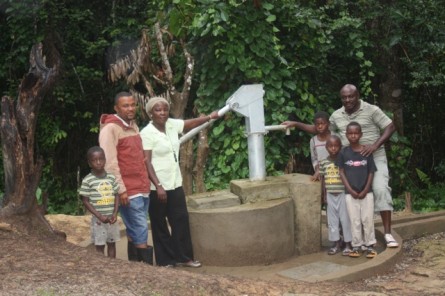 The Peace Hut Alliance team Harper Karmon, Annie Nushann, and Christian Bethelson at the new well with children of Telewoyan Village
The Peace Hut Alliance team Harper Karmon, Annie Nushann, and Christian Bethelson at the new well with children of Telewoyan Village
The Liberian Peace Hut Alliance is providing former combatants with the opportunity to “come home” and integrate back into their community with dignity. The team reports that each brick and nail in the construction of a Peace Hut takes away another piece of the shame and horror of war, transforming former combatants into messengers for peace.
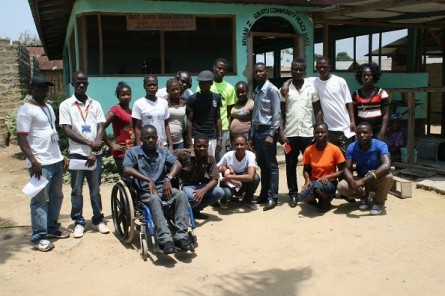 Youth Participants, including child soldiers, at a training in the Ganta Peace Hut
Youth Participants, including child soldiers, at a training in the Ganta Peace Hut
The History of the Liberia Peace Hut Alliance
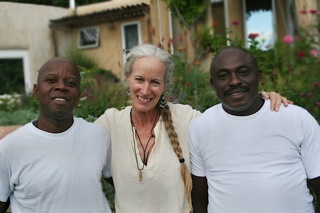
William “Uncle Jake” Jacobs (L) and Christian Wolo Bethelson (R) with Dharmacharya Cynthia Jurs
In December 2009, Alliance for the Earth carried an Earth Treasure Vase to the hardest fought region of the country through the auspices of everyday gandhis, an organization working with ex-combatants, child soldiers, women and indigenous elders to bring healing and build peace.
Click here to learn more about the Earth Treasure Vase practice
An Earth Treasure Vase was buried in the roots of a sacred kola nut tree in Telewoyan Village, Lofa County, outside of Voinjama, in a community-wide ceremony on the winter solstice.
Please enjoy our video journal of this remarkable healing ceremony:
Through the generous support of the Frost Foundation, the ETV Global Healing Project returned to Liberia in March 2011 to tend these prayers and water the seeds of peace that were planted. Joyfully, we returned to participate in the community dedication of a Peace Hut constructed at the site where the ETV is buried. This hut was so well received that it was selected by the elders of Voinjama, during Liberia’s 164th Independence Day ceremony in July 2011, as the primary center for settling any future disputes amongst the citizens of Lofa County.
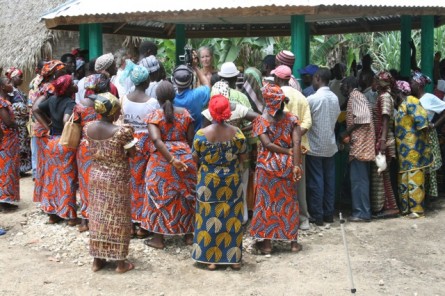 Dedication of the Telewoyan Village peace hut, March 2011
Dedication of the Telewoyan Village peace hut, March 2011
Please view “Life is Returning,” the dedication of this first Peace Hut on March 27, 2011, here
Our second Peace Hut was built in Ganta, Nimba County, on land given by the Mayor and City Councilors in the Gbartu Quarter.
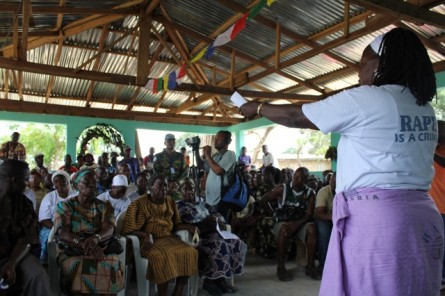 Annie Nushann addressing the community at the dedication of the Ganta Peace Hut
Annie Nushann addressing the community at the dedication of the Ganta Peace Hut
The third Peace Hut was built in Waisue, Bong County.
Mindfulness in Peace Building
“When people I work with — former child soldiers and ex-combatants — hear the bell, it gives them a moment of mercy, a moment of freedom from the mental and emotional anguish they are living with.”
— Christian Bethelson, Field Coordinator, Peace Hut Alliance
A key aspect of the Peace Hut Alliance is ongoing training in mindfulness.
Working for social change requires an ability to respond to whatever arises. So much of the work “out there” causes us to forget and override “in here.” The Peace Hut Alliance team members have participated in regular retreats and teachings with Alliance for the Earth founder, Cynthia Jurs, as a part of our ongoing work of sacred activism. Cynthia is a Dharmacharya ordained in the Order of Interbeing of Zen Master, Thich Nhat Hanh, and teaches and practices in his tradition of “Engaged Buddhism.”
The Liberians have discovered that mindfulness meditation is a powerful peacemaking tool. It allows activists to refuel their passion, connect with a source of peace within, and become more effective in their work. At the intersection of our concerns for peace and social justice and the ecological crisis, we meet to engage in contemplation and discourse and support each other in a practice of cultivating mindful awareness.
Christian Bethelson, a former combatant, has attended retreats with Zen Master Thich Nhat Hanh (who was nominated by Dr. Martin Luther King, Jr. for the Nobel Peace Prize in 1967) in the US and France, where he deepened his understanding significantly. The practice he learned in these retreats has facilitated a profound transformation in him. He is now a man of peace, teaching others to ring the bell of mindfulness and breathe in and out with mindfulness, to recover their true selves.
The practice of mindfulness helps one to come to terms with suffering – the suffering of oneself and of others, and to develop understanding. Through the practice of meditation, it is possible to recover from past traumas and hurt, release ourselves from the past and extend our commitment in service to the larger world – the foundation of community peace-building efforts in Liberia.
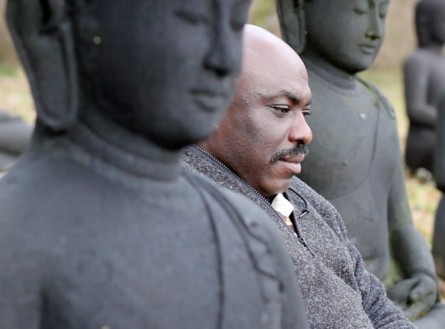 Bethelson in the Buddha Garden in Thich Nhat Hanh’s Plum Village, France.
Bethelson in the Buddha Garden in Thich Nhat Hanh’s Plum Village, France.
Get Involved
This humble, grassroots effort can clearly make a difference in the lives of many communities throughout Liberia, with each community providing the land, design and labor for their own Peace Hut and well. Members of the Peace Hut Alliance bring people together on a regular basis inside the Peace Huts to learn conflict resolution skills, training in women’s empowerment and community leadership, reconciliation and dialogue, storytelling, and mindfulness meditation. And of course they gather there to pray, eat, dance, and play soccer. With each brick of every hut, a strong foundation for peace is intended to take root in Liberia.
Bethelson and Harper also address the public about community peacebuilding on their weekly national radio program, “Conversations Under the Peace Hut”.
A little goes a long way:
$8000 builds a Peace Hut
$5000 digs a village well
$200 keeps the radio program “Conversations Under the Peace Hut” on the air for 1 week
Our Liberia Partners
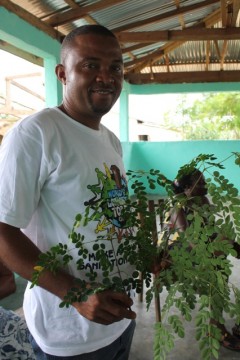 Harper M. Karmon is a community organizer, social worker, peacebuilder and the Manager of the Peace Hut Alliance for Conflict Transformation with Alliance for the Earth – which has (so far) constructed three peace huts in three counties in Liberia. He travels all over Liberia mobilizing communities in peacebuilding and organizes trainings to empower women, and teach former combatants the skills of conflict resolution inside the Peace Huts.
Harper M. Karmon is a community organizer, social worker, peacebuilder and the Manager of the Peace Hut Alliance for Conflict Transformation with Alliance for the Earth – which has (so far) constructed three peace huts in three counties in Liberia. He travels all over Liberia mobilizing communities in peacebuilding and organizes trainings to empower women, and teach former combatants the skills of conflict resolution inside the Peace Huts.
During the war, Harper was a proud supporter of the Liberian Women’s Mass Action for Peace (headed by Nobel peace prize winner, Leymah Gbowee) and stood firmly with them, praying and fasting for the country and demanding a cease fire and mediation between the warring factions. As a filmmaker, he documented their activities in the sun and rain, day after day.
He is a trained nurse with an interest in the environment who majored in Forestry Management at the University of Liberia. He became a trainer in peace building, conflict transformation and reconciliation for the Trauma Healing and Reconciliation Program (THRP) where he also served as head of the social workers on a special psychosocial intervention project for Ivorian Refugees in Nimba County from 2011-2012. He lives in Monrovia and is a father of four.
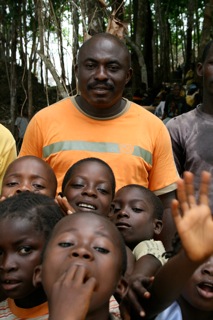
Christian Wolo Bethelson spent 27 years in the Liberian National Army, was trained in Libya, Israel and Romania and served as one of President Samuel Doe’s personal bodyguards. When Charles Taylor took power, Bethelson was imprisoned and tortured. He escaped and joined the rebel forces, fighting under the name General Leopard.
After the 14-year civil war ended, he was on his way to offer his mercenary services in the Ivory Coast when he happened to meet the peacebuilding group Everyday Gandhis, who invited him to join them instead.
In 2010 he became the Field Coordinator for Alliance for the Earth, where he has done community outreach and helped to oversee a grassroots Peace Hut building program. Bethelson continues his training in mindfulness meditation in the tradition of Thich Nhat Hanh and now teaches mindfulness to other ex-combatants inside the Peace Huts.
He speaks 12 languages and enjoys drumming, dancing and singing. He and his wife Rebecca have 3 children and live in Monrovia, Liberia.
A wonderful account of Bethelson’s story can be found here at Yes! Magazine.
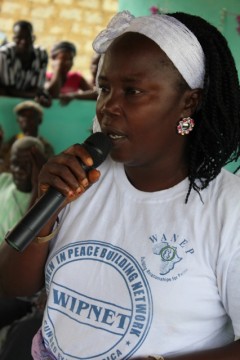 Annie L. Nushann is a fearless women’s rights activist with a powerful voice and is a respected social justice crusader within Liberia. “Ma Annie” serves as a consultant for the UN Women in Africa and is the Bong County Coordinator for WIPNET (the Women In Peace-Building Network). She is a National Consultant for the Liberian Peace Hut Initiative and Coordinator-Manager for the Women’s Program of the Peace Hut Alliance for Conflict Transformation (PHACT). Annie’s focus is to empower women by educating them on their rights and mobilizing them in violence prevention and peacebuilding.
Annie L. Nushann is a fearless women’s rights activist with a powerful voice and is a respected social justice crusader within Liberia. “Ma Annie” serves as a consultant for the UN Women in Africa and is the Bong County Coordinator for WIPNET (the Women In Peace-Building Network). She is a National Consultant for the Liberian Peace Hut Initiative and Coordinator-Manager for the Women’s Program of the Peace Hut Alliance for Conflict Transformation (PHACT). Annie’s focus is to empower women by educating them on their rights and mobilizing them in violence prevention and peacebuilding.
Born into a poor rubber tapper family, Annie was unable to complete her secondary school education. She married the Reverend Flomo L. Nushann and mothered ten children. Through the church, Annie found her voice and became a leader. She was recognized as a speaker and organizer for women’s groups in various congregations and served as President of the Pastor’s Wife Association of the Lutheran Church in Liberia.
During the civil war, the Liberian Mass Action for Peace under the auspices of WIPNET engaged in collaborative activity, going beyond tribe, creed, religion, status or political affiliation to help bring an end to this crisis. Annie’s commanding presence and ability to calm rebel soldiers earned her a powerful reputation. Rural women would request a visit from “Ma Annie” following a surge of rebel-led activity, knowing that she would be able to help quell the violence. Annie worked alongside other war-weary women to use nonviolent actions to bring an end to the civil war. After 14 years and an estimated 250,000 deaths, warring factions signed a peace agreement in 2003.
Through Annie’s charismatic and brave leadership, she was selected to serve as the leader of the Totota branch of WIPNET from 2004-2007. There, under her leadership, the women contributed immensely to the disarmament of fighters which brought peace to Liberia. In 2007 she was elevated to County Coordinator of WIPNET, a position she still holds today.
Annie now works across Liberia to rebuild trust in communities and bring about greater accountability for crimes against women. She diligently meets with groups of women to discuss their concerns, and in turn takes these concerns to community leaders. When necessary, Annie takes the women’s voices to the highest level, challenging the President of Liberia, Ellen Johnson Sirleaf, to act.
Annie has been recognized by many international organizations including the United Nations, where she served as a consultant for Peace Hut Management for the UN Women from 2009-2014. Upon invitation, Annie has traveled to Nigeria, Ghana, South Sudan, Guinea, Sierra Leone, Benin, Ireland, Norway, New York City.
Today, as Coordinator and Manager for the Women’s Program of the Peace Hut Alliance for Conflict Transformation (PHACT), Annie works to organize, mobilize, teach, train, empower and inspire many women – and some brave men and youth – inside the Peace Huts. Her capacity as an activist and educator has greatly improved the effectiveness of the organization and brought great success to the programs under the Peace Huts.
